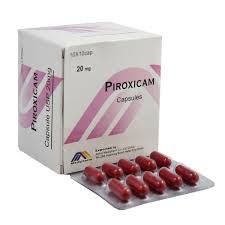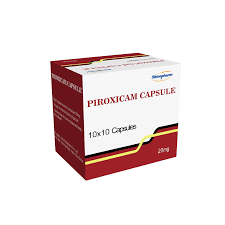Piroxicam 20mg Capsules are a nonsteroidal anti-inflammatory drug (NSAID) used primarily for the treatment of pain and inflammation associated with conditions such as osteoarthritis and rheumatoid arthritis. Each pack typically contains 100 capsules (10 strips of 10 capsules each).
Active Ingredient
- Piroxicam (20 mg): The active ingredient that helps reduce pain, inflammation, and fever by inhibiting the production of prostaglandins, substances in the body that mediate inflammation and pain.
Indications
Piroxicam is indicated for:
- Rheumatoid Arthritis: Relief from symptoms such as joint pain and swelling.
- Osteoarthritis: Management of chronic pain and inflammation in joints.
- Other Conditions: May also be used for other inflammatory conditions as determined by a healthcare provider.
Dosage Instructions
- Adults: The usual recommended dose is 20 mg orally once daily. Alternatively, it can be taken as 10 mg twice daily.
- Children: Safety and effectiveness in children have not been established; consult a healthcare provider for pediatric dosing.
Administration
- Take piroxicam with food or a full glass of water to minimize gastrointestinal irritation.
- Do not exceed the prescribed dosage to avoid potential side effects.
Side Effects
Common side effects may include:
- Indigestion or stomach upset
- Nausea or vomiting
- Dizziness or headache
- Diarrhea or constipation
Serious side effects can include:
- Gastrointestinal bleeding (e.g., bloody or black stools)
- Heart attack or stroke risk, especially with long-term use
- Severe allergic reactions (e.g., rash, difficulty breathing)
- Liver or kidney problems
Precautions
- Contraindications: Not recommended for individuals with a history of allergic reactions to NSAIDs, active peptic ulcer disease, severe heart failure, or those who have recently undergone coronary artery bypass surgery.
- Pregnancy and Breastfeeding: Consult a healthcare provider before use during pregnancy or breastfeeding due to potential risks to the fetus or infant.
- Drug Interactions: Inform your healthcare provider about all medications being taken to avoid interactions, especially with anticoagulants, other NSAIDs, and certain antihypertensives.







